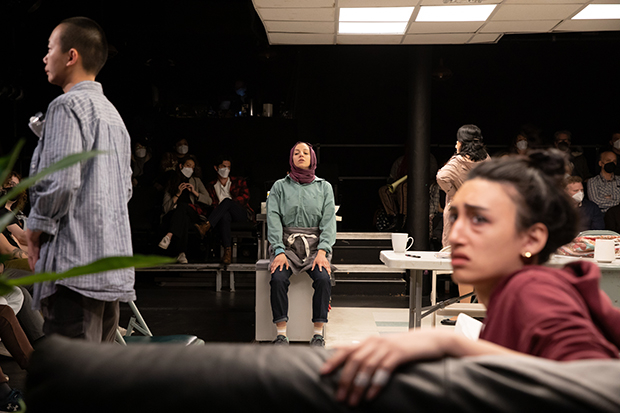Interview: Collective Action, Class Solidarity, and the Truth-Telling of Mei Ann Teo
Mei Ann Teo directs ”7 Minutes” at Waterwell, a penetrating depiction of unionized factory workers confronting labor conditions and the power struggle.
7 Minutes, written by Stefano Massini (The Lehman Trilogy) and translated by Francesca Spedalieri, is currently receiving its US premiere via Waterwell at HERE through April 10. In the production, based on actual people and events, 11 women and gender non-conforming actors play Connecticut textile factory workers. Mei Ann Teo (they/she) directs with a tribute to the reality of organizers in the United States, historical and present. We spoke to Teo about their arrival to the production, their imagination in casting, and the impact of this landmark production.

(image provided by the production)
This conversation has been condensed and edited for clarity.
How does 7 Minutes fit in your theater practice? Do you see your own self or lived experiences in the show?
I was directing a show at a theater company where I very quickly realized in four rehearsals that I was becoming their EDI and HR department. They did not have the structure to produce theater safely or humanely for especially the POCs and the women and femmes in the company. And I had to step away from that show. I had to call my union and say, "This is not a good situation here." I've never stepped away from a show but I could not stay in good conscience. And despite the fact that I felt like my presence will help solve so much, I started to realize that one person doesn't…You have to make a bigger stand. When I was handed 7 Minutes to consider whether or not I should direct, I remember the play working inside of me.
Even before watching the play, your production is already doing something radical with a cast of all women or gender-non-conforming people of color. How does this, versus an all-white 7 Minutes, affect the shape of the story?
There are some things we needed to think about to make it relevant to the actual struggle of collective action here in the United States. What the play doesn't necessarily have, transferring it from Italy to the United States, is that this country, and this land, has the history and legacy of enslaved peoples. That when we talk about free labor and giving over a free "seven minutes" of time, there is a different resonance when you are on the land which has profited. The dominant structures have profited so much from enslaved labor.
There's a different feeling when a character who's cast as a Black woman says, "Always the same, always the same, always the same." What does that mean when you actually cast it in a way that reflects the continued struggles of lower pay? I was also really interested in making sure that we're actually telling the story of our history, instead of the habit of falling to white supremacist casting ideas.
One of the things we were deeply thinking about was anti-Blackness and colorism. We really attended to what that meant in the room. Because even though it's all POC artists, that doesn't mean that anti-Blackness is not in the room. In fact, it's always in the room. And white supremacy is always in the room.

(© Julieta Cervantes)
What do you want people to feel and talk about when they see this play?
We had some of the Starbucks organizers come to the show [recently], and we did a talk with them. There were a lot of folks in the room who belong to unions, and I remember the nods, and the yeses, that resonance of not being alone in the deep struggle of what we can do to hold our own survival. Our collective liberation together is actually what the pressures of capitalism and patriarchy are pushing us into the corner with. So, I'm really excited for people to come away caring about each and every one of these people and their struggle [and an understanding of] what it means to not have power and what it means to be together to have power.
I'd be surprised if someone sits there and isn't able to see themselves because the pandemic has radically changed the way we all think about our own labor at work or school.
Well, let me share with you something that happened last night. Someone in the audience said, "You know, I guess I am a suit." And then he asked the Starbucks organizer, "Well, what are you asking for?" And he asked in a way that was like, "Are you petulant children asking for raises or something?" And one of the workers said, "We are asking to make sure that we have safe environments to work, and we're asking to not need to work when we're sick." In this time, we're talking about basic human rights of safety and, actually, in this time we don't want people working sick because we don't want other people getting sick. Quite quickly, he was like, "Oh." But there's an immediate assumption that workers are greedy.
For the worker to have to spell out that dehumanization that's been a reality forever — we then realize how much we've internalized the capitalism. I think about my parents as factory workers themselves; they have always and will always live that existence.
What do you think your parents, seeing this play, would think? Or say?
Because she's been employed for decades without protection or collective action, my mom would feel like this is a piece of fiction or fantasy.
That's so powerful to me because that's exactly how the characters in the play feel. That it is a fiction that one could have power and take action. You're actually talking about the exact thing the characters feel themselves.
There's this combination of joy in being seen — then pessimism that this won't happen in our workplace. It's a legacy of dead ends.
If we look at where unions are right now and how corporate busting has been taking place, they have achieved that for women to be in their position. And that's why unions are still organizing. I met Elise A. Bryant, the president of the Coalition of Labor Union Women. She talked to us about everything and this is exactly why we have to promote unionizing, so that workers have access to the possibility that their needs can actually be heard beyond the stakeholders and their profits. What you're saying is exactly why we need to do the play. Why we need to continue to organize into unions. I think that there's a lot of passion. And we cannot have passion without some semblance of joy.









